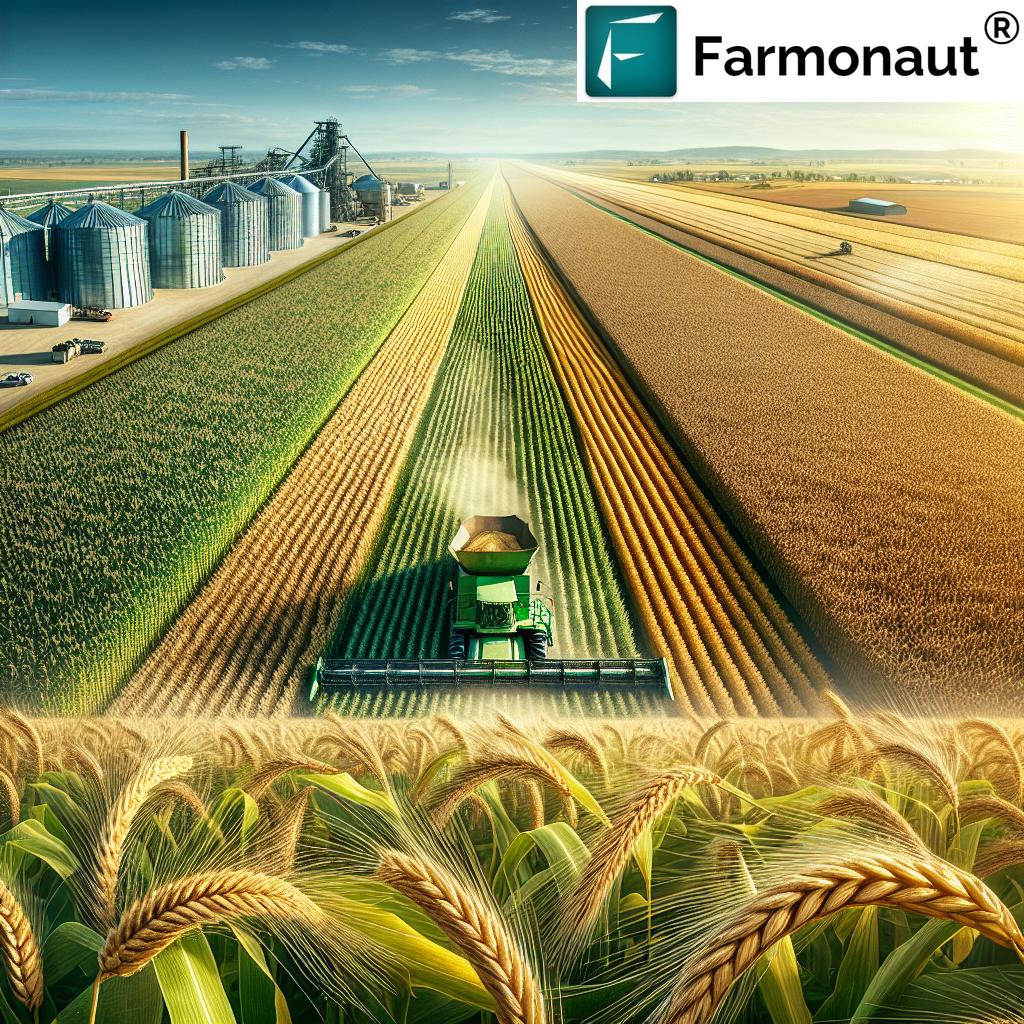Agriculture Loans North Carolina: Boosting 2025 Farms
Agriculture is not just a pillar of the North Carolina economy—it’s the heartbeat of rural communities and the foundation of food security in the region. As we enter 2025, the role of agriculture loans North Carolina remains essential for supporting farm growth, sustainability, and resilience. With the state continuously ranking among the top agricultural states in the United States, North Carolina’s farmers face evolving challenges ranging from climate variability to fluctuating market conditions. In this blog, we explore how agriculture loans empower farmers, foster innovation, and drive sustainable practices to ensure North Carolina continues to thrive in 2025 and beyond.
“In 2023, North Carolina issued over $1.2 billion in agriculture loans, fueling sustainable farm growth for 2025.”
The Importance of Agriculture in North Carolina’s Economy and Communities
The legacy of agriculture in North Carolina stretches back generations. The state boasts a diverse agricultural sector, ranging from tobacco and sweet potatoes to soybeans, poultry, livestock, and an expanding roster of specialty crops. Agriculture in the Americas, particularly across the southern states, is a vibrant tapestry of both tradition and innovation. North Carolina’s farms contribute billions of dollars annually to the state economy, making it a true cornerstone of rural community well-being.
- Employment and Community Stability: Agriculture supports hundreds of thousands of jobs. These opportunities help maintain population stability and foster community ties in rural areas.
- Diverse Production: From animal production to specialty crops, North Carolina stands as a national leader in both volume and value.
- Cultural Heritage: Deeply embedded in North Carolina’s culture, farming shapes local traditions, festivals, and even cuisine.
- Resilience: Faced with climate risks, rising costs, and the ongoing need to innovate, the state’s agriculture sector demonstrates adaptability and strength year after year.
However, to ensure growth, sustainability, and resilience—especially in the face of extreme weather and an evolving global market—well-structured agriculture loans North Carolina continue to be critical.
Agriculture Loans North Carolina: Role in Farming Resilience and Growth
The 2025 landscape brings both promise and challenges for North Carolina farmers. Access to loans—from federal, state, and private lenders—acts as a lifeline, helping operators manage operating expenses, upgrade equipment, adopt sustainable practices, and cushion the impact of fluctuating prices or adverse weather events.
Key Functions of Agriculture Loans in North Carolina:
- Seasonal Input Costs: Covering costs for seeds, fertilizers, and crop protection products at the start of planting seasons, which is particularly essential due to North Carolina’s diverse growing calendar.
- Equipment and Infrastructure Investment: Investing in innovative technologies (e.g. precision planting, climate-smart irrigation, AI-driven monitoring) and upgrading old machinery to comply with sustainability standards and increase efficiency.
- Land and Facility Purchases: Supporting farmers in either expanding their land base or modernizing barns, storage, and processing facilities—critical for meeting market demands and ensuring food safety.
- Diversification and Value Addition: Empowering producers to diversify crops or begin value-adding ventures, such as on-farm packaging or processing for direct-to-consumer distribution.
- Climate and Risk Management: Financing enables producers to invest in risk management products, crop insurance, and weather resilience tools.
Importantly, in 2025, loan programs are tuned to prioritize sustainable farming and climate-smart practices—aligning with both national and global goals on soil health, water conservation, and reduced environmental impact.
“More than 60% of North Carolina’s new farm loans in 2024 supported climate-smart and diversified crop practices.”
2025 North Carolina Agriculture Loan Types: Comparison Table
Choosing the right financing product is vital for North Carolina farmers aiming to adopt sustainable and innovative practices. The table below compares major agriculture loan types available in North Carolina, highlighting their alignment with sustainability, innovation, and agriculture sector needs in 2025:
| Loan Type | Purpose (e.g., Sustainable Equipment, Diversification) | Estimated Loan Amount Range (2025) | Estimated Interest Rate (%) | Eligibility Criteria | Key Sustainability Benefits |
|---|---|---|---|---|---|
| USDA Direct Operating Loans | Input/working capital, new equipment, cover crops, sustainable transition | $5,000 – $400,000 | 3.0% – 4.5% | Small/medium ops; must meet USDA/FSA eligibility | Supports eco-friendly inputs; enables adoption of sustainable farming tech |
| USDA Guaranteed Loans | Expansion, upgrades, large scale innovation, climate-resilient infrastructure | $50,000 – $2,000,000 | 4.0% – 6.0% | Qualified lenders; must meet USDA guidelines | Enables weather-resilient practices and upgrades for carbon reduction |
| Private Agri-Bank Loans | Diversification, tech adoption, operational flexibility | $10,000 – $5,000,000+ | 5.0% – 8.5% | Creditworthy applicants with collateral | Funds cutting-edge sustainable tools and practices |
| State & Local Agri Loan Programs | Specialty/organic crop transition, local product development | $2,000 – $250,000 | 3.5% – 5.2% | State residency; crop/orchard type may apply | Promotes local food, sustainable products, low-emission farming |
| Beginning/Socially Disadvantaged Farmer Loans | Startup/expansion, inclusive market entry, sustainable land access | $5,000 – $600,000 | 3.0% – 4.0% | First-time, veteran, or minority farmers in NC | Encourages diversity, new sustainable operations, innovation |
*Estimated ranges. Check with relevant agencies/lenders for the most current rates and eligibility rules for 2025.
Compare options carefully—each loan type serves a unique segment of the sector, with programs tailored to sustainability, climate resilience, and next-generation agricultural technology.
Emerging Trends Shaped by Agriculture Loans North Carolina
As the agriculture sector evolves, the impact of agriculture loans in North Carolina is most clearly seen in the following future-facing trends:
-
Technology Integration:
- Farmers are rapidly adopting precision agriculture—including GPS-guided machines, AI-powered crop health monitoring, and sensor-driven irrigation systems. Up-front costs for these innovative technologies are offset by loans specifically designed for modernization.
- Investments in AI and satellite-based tools not only optimize production but also reduce waste and increase profitability.
-
Sustainable and Regenerative Practices:
- Strong loan incentives exist for cover cropping, no-till farming, advanced pest management, and water conservation systems—all helping to protect North Carolina’s precious soils and waterways.
- Loan-supported education programs enable farmers to leverage these practices efficiently and maximize their environmental and financial returns.
-
Crop Diversification & Value-Added Ventures:
- Many loan programs encourage farms to diversify crops—from sweet potatoes to niche fruits, specialty vegetables, and sustainable animal production.
- Loans help with on-farm investment in packaging, branding, and direct-to-market sales that boost profitability and market resilience during tough years.
-
Risk Management:
- Agricultural loans allow for the purchase of crop insurance and risk-mitigation infrastructure—an essential safeguard as weather becomes more unpredictable and market prices more volatile.
- New risk assessment models, including climate risk factors, are increasingly adopted by North Carolina lenders in their loan underwriting, encouraging resilient approaches across the sector.
Supporting Sustainable Practices and Climate-Smart Farming in North Carolina
The growing focus on sustainability is not only a global imperative but also a local necessity—especially as North Carolina faces increased weather extremes, soil health challenges, and the need for carbon reduction. Agriculture loans North Carolina play an essential role in meeting these demands:
-
USDA FSA and State Programs Align with Climate Goals
- Low-interest loan products actively support the adoption of sustainable equipment and practices.
- Loans encourage cover cropping, minimal tillage, micro-irrigation, and renewable energy adoption on farms.
-
Carbon Footprint Tracking & Environmental Compliance
- Certain programs provide incentives or loan discounts for farms that measure and report their carbon footprint or engage in environmental impact tracking.
- Platforms like Farmonaut’s Carbon Footprinting offer satellite-based tracking—helping farmers and lenders verify emissions reductions and support smart loan decisions in North Carolina.
-
Resource Management & Traceability
- Financial institutions are increasingly seeking satellite-verified proof for loans and insurance. Farmonaut Product Traceability solutions use blockchain to ensure transparency throughout the agricultural supply chain.
- Such technology not only supports compliance with regulations but also builds trust with consumers demanding responsible farming.
Technology, Diversification and Value-Adding: How Loans Empower Innovation
Modern farm resilience is deeply tied to continuous innovation, diversification, and financial flexibility. In 2025, agriculture loans in North Carolina are at the center of several growth opportunities:
-
Precision Agriculture: Reduced resource usage, increased yield, and adaptive response to climate—all enabled by loan-backed investment in digital and satellite tech.
- AI gadgets, sensor arrays, and drone monitoring tools require up-front capital but can pay back through lower input costs and higher, more consistent yields.
-
Smart Management Platforms:
- Comprehensive digital platforms allow farmers to manage entire operations in real time. Farmonaut’s Large Scale Farm Management tools specifically enable NC producers to track crop health and optimize resources, supporting sustainable production at scale.
-
Transition to Organic and Regenerative Models:
- Many loan programs include grant-like funds to enable the transition to organic or regenerative agriculture—reducing environmental impact and improving soil health.
- Platforms like Farmonaut’s Crop Plantation and Forest Advisory support advisory and compliance monitoring for transitioning farmers.
-
Fleet and Equipment Optimization:
- Fleet management is a key component of modern, efficient, low-emission agriculture. Farmonaut’s Fleet Management tools enable real-time tracking for both equipment and vehicles—reducing idle-time and unnecessary fuel consumption, driving down overall operational costs.
These advancements empower farms—big and small—to keep pace with the future of agriculture in North America, responding with agility to new market opportunities and regulatory requirements.
Challenges, Opportunities, and the Future of Agriculture Financing in North Carolina
Despite the robust availability of agriculture loans North Carolina has to offer, accessing credit is not always easy—especially for beginning producers or those without strong collateral or established credit history. Addressing these obstacles is necessary not just for the stability of the farming community, but also for the broader economic prosperity and food security of the state.
Key Challenges Facing North Carolina Farmers:
- Eligibility & Regulatory Barriers: Navigating federal and state entities like the USDA Farm Service Agency (FSA) or direct/guaranteed programs can be complex for new applicants.
- Collateral & Credit: Young and innovative producers may lack sufficient collateral or a formal credit track record.
- Market Volatility and Climate Risks: The twin threats of unpredictable weather events and fluctuating market prices underscore the need for robust risk management tools—requiring more flexible, accessible loan products.
- Financial Literacy & Outreach Gaps: Many eligible farm operators remain unaware of new sustainable loan products or lack the training to prepare successful loan applications.
Opportunities for 2025 and Beyond:
- Leveraging satellite-driven solutions for remote monitoring and loan verification—enhancing transparency and accessibility in both loan approval and ongoing compliance documentation.
- Integrating climate-smart metrics into loan terms—rewarding resilience and lower environmental footprints with better rates.
- Expanding educational resources through state agencies and digital platforms, equipping more North Carolina producers to take advantage of the full range of 2025 agricultural finance opportunities.
- API ecosystem and digital integration: APIs such as the Farmonaut Satellite API and Developer Docs allow lenders and farm software companies to embed monitoring, weather analysis, and verification directly into their platforms—making the entire ecosystem smarter and more efficient.
Access to agriculture loans North Carolina must remain at the center of agricultural resilience and innovation as we look toward 2025 and beyond. New tools, stakeholder collaboration, and supportive policies will help usher in the next era of sustainable farming in North Carolina.
Farmonaut Solutions for North Carolina Farmers Seeking Sustainable Growth
As we explore the crucial topic of agriculture loans North Carolina, it is equally important to highlight the role of satellite and digital technology in fostering sustainable agricultural practices. At Farmonaut, our mission is to equip North Carolina’s farming communities with the tools and insights to drive resilient growth, streamline regulatory compliance, and ensure sustainable resource management.
Our platform uses satellite imagery, AI-based analytics, and blockchain traceability to deliver actionable, real-time intelligence directly to farmers, businesses, and financial institutions. Here’s how Farmonaut strengthens the connection between finance, technology, and sustainability for North Carolina farms:
- Satellite-based Crop Monitoring: We provide NDVI-based health assessments, soil moisture evaluation, and environmental impact tracking, helping farmers optimize water, fertilizer, and pesticide use.
- AI Advisory for Risk and Resource Management: The Jeevn AI system gives real-time alerts and custom recommendations, helping users improve yields, mitigate weather risk, and quickly respond to emergencies.
- Blockchain Traceability: We offer secure, end-to-end visibility across supply chains, which helps meet evolving loan and insurance verification requirements.
- Resource & Fleet Management: Farmonaut’s integrated tools support efficient operation of equipment, reducing downtime and improving financial returns on loan-funded machinery and vehicles.
- Financial Access: By providing satellite-based field verification and reporting, we help financial institutions expedite loans and insurance for agriculture—reducing fraud and supporting timely disbursement of funds.
- Sustainability Compliance: Our Crop Loan and Insurance tools connect farm operators to the data and documentation needed for green loan and sustainable farm credit in North Carolina.
Our tools help agriculture in North America, including North Carolina, innovate and thrive in a responsible, tech-driven future.
Frequently Asked Questions: Agriculture Loans North Carolina
1. What types of agriculture loans are available to North Carolina farmers in 2025?
North Carolina farmers have access to USDA Direct and Guaranteed Loans, beginning/socially disadvantaged farmer loans, State and Local Agri-Loan programs, as well as private bank loans. Many of these are tailored for sustainable, innovative, or diversified farm projects. Eligibility, amounts, and rates vary by product.
2. How do agriculture loans North Carolina support sustainable and climate-smart agriculture?
Many loan programs locally and federally prioritize funding for practices like cover cropping, minimal tillage, water conservation, and carbon footprint tracking. Sustainable investments supported by loans help improve soil health, conserve water, and reduce environmental impact, making farms more resilient.
3. Who is eligible for agriculture loans in North Carolina?
Eligibility varies by loan type. USDA and state programs often cater to beginning, small-scale, veteran, or socially disadvantaged farmers, while private loans typically require stronger collateral and credit history. Specialized programs exist to encourage diversity and new market entrants.
4. How can satellite and AI technologies, like Farmonaut, help farmers access loans?
Farmonaut’s satellite-driven monitoring, blockchain traceability, and AI advisory help document sustainability practices, crop health, and compliance. These data-based tools expedite loan/insurance processing and verification—particularly valuable for lenders looking to support sustainable farms in North Carolina.
5. Are there digital tools to help manage the use of agricultural loans?
Yes, Farmonaut provides real-time fleet, resource, and farm management solutions to optimize equipment use and production, track environmental KPIs, and report compliance—all ensuring funds are used efficiently and sustainably.
6. Where can I find more in-depth technical documentation for satellite integration with financial or farm management systems?
Visit the Farmonaut API page and Farmonaut API Developer Docs for detailed technical resources.
Conclusion: Agriculture Loans in North Carolina—Empowering Farmers for a Sustainable Future in 2025
As we look to the future, it is clear that agriculture loans North Carolina will remain a core enabler of farm stability, innovation, and sustainable growth. These financial products empower North Carolina’s farmers to modernize equipment, diversify crops, adopt environmental best practices, and weather the shifting tides of market and climate.
With satellite-powered tools, blockchain verification, and robust state support, the gap is closing for beginning, small-scale, and underrepresented producers—ensuring that agriculture in North America (and particularly North Carolina) remains dynamic and inclusive. Strategic partnerships between technology providers, lenders, and the agricultural sector will further propel the sector toward a sustainable and resilient future.
Farmonaut is committed to making next-generation insights accessible and actionable for North Carolina agriculture—helping every community adapt to the challenges of tomorrow while honoring the rich heritage of North Carolina farming.
Ready to get started? Explore the Farmonaut App, join the API ecosystem, and discover crop loan, insurance, carbon footprinting, fleet management, and large-scale farm management solutions for North Carolina producers.
Take the first step into the future of sustainable agriculture—right here.
Keywords in focus for better SEO reach: agriculture in north america, agriculture of america, agriculture in central america, agriculture in the americas, agriculture loans north carolina, farm, farmers, loans, carolina, rural, crops, soil, sustainable, financial, sector, climate, management, resilience, community, support, innovation, state, and more.















